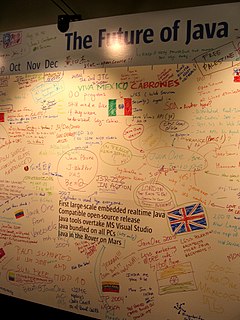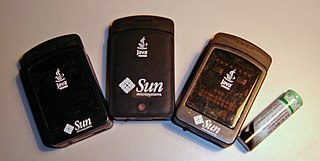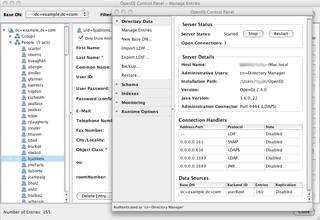
Sun Microsystems, Inc. was an American technology company that sold computers, computer components, software, and information technology services and created the Java programming language, the Solaris operating system, ZFS, the Network File System (NFS), and SPARC microprocessors. Sun contributed significantly to the evolution of several key computing technologies, among them Unix, RISC processors, thin client computing, and virtualized computing. Notable Sun acquisitions include Cray Business Systems Division, Storagetek, and Innotek GmBH, creators of VirtualBox. Sun was founded on February 24, 1982. At its height, the Sun headquarters were in Santa Clara, California, on the former west campus of the Agnews Developmental Center.

Solaris is a proprietary Unix operating system originally developed by Sun Microsystems. After the Sun acquisition by Oracle in 2010, it was renamed Oracle Solaris.

OpenOffice.org (OOo), commonly known as OpenOffice, is an open-source office suite. It was an open-sourced version of the earlier StarOffice, which Sun Microsystems acquired in 1999 for internal use. Sun open-sourced the OpenOffice suite in July 2000 as a competitor to Microsoft Office, releasing version 1.0 on 1 May 2002.

NetBeans is an integrated development environment (IDE) for Java. NetBeans allows applications to be developed from a set of modular software components called modules. NetBeans runs on Windows, macOS, Linux and Solaris. In addition to Java development, it has extensions for other languages like PHP, C, C++, HTML5, and JavaScript. Applications based on NetBeans, including the NetBeans IDE, can be extended by third party developers.

JavaOne is an annual conference first organized in 1996 by Sun Microsystems to discuss Java technologies, primarily among Java developers. It was held in San Francisco, California, typically running from a Monday to Thursday in summer months or in early fall months (later). Technical sessions and Birds of a Feather (BOF) sessions on a variety of Java-related topics were held throughout the week.

OpenSolaris is a discontinued open-source computer operating system based on Solaris and created by Sun Microsystems. It was also, perhaps confusingly, the name of a project initiated by Sun to build a developer and user community around the eponymous operating system software.
HotSpot, released as Java HotSpot Performance Engine, is a Java virtual machine for desktop and server computers, developed by Sun Microsystems and now maintained and distributed by Oracle Corporation. It features improved performance via methods such as just-in-time compilation and adaptive optimization.
A source-code-hosting facility is a file archive and web hosting facility for source code of software, documentation, web pages, and other works, accessible either publicly or privately. They are often used by open-source software projects and other multi-developer projects to maintain revision and version history, or version control. Many repositories provide a bug tracking system, and offer release management, mailing lists, and wiki-based project documentation. Software authors generally retain their copyright when software is posted to a code hosting facilities.

GlassFish is an open-source Jakarta EE platform application server project started by Sun Microsystems, then sponsored by Oracle Corporation, and now living at the Eclipse Foundation and supported by Payara, Oracle and Red Hat. The supported version under Oracle was called Oracle GlassFish Server. GlassFish is free software and was initially dual-licensed under two free software licences: the Common Development and Distribution License (CDDL) and the GNU General Public License (GPL) with the Classpath exception. After having been transferred to Eclipse, GlassFish remained dual-licensed, but the CDDL license was replaced by the Eclipse Public License (EPL).

Sun SPOT was a sensor node for a wireless sensor network developed by Sun Microsystems announced in 2007. The device used the IEEE 802.15.4 standard for its networking, and unlike other available sensor nodes, used the Squawk Java virtual machine.

Java is a set of computer software and specifications developed by James Gosling at Sun Microsystems, which was later acquired by the Oracle Corporation, that provides a system for developing application software and deploying it in a cross-platform computing environment. Java is used in a wide variety of computing platforms from embedded devices and mobile phones to enterprise servers and supercomputers. Java applets, which are less common than standalone Java applications, were commonly run in secure, sandboxed environments to provide many features of native applications through being embedded in HTML pages.
OpenJDK is a free and open-source implementation of the Java Platform, Standard Edition. It is the result of an effort Sun Microsystems began in 2006. The implementation is licensed under the GPL-2.0-only with a linking exception. Were it not for the GPL linking exception, components that linked to the Java class library would be subject to the terms of the GPL license. OpenJDK is the official reference implementation of Java SE since version 7.

JavaFX is a software platform for creating and delivering desktop applications, as well as rich web applications that can run across a wide variety of devices. JavaFX has support for desktop computers and web browsers on Microsoft Windows, Linux, and macOS, as well as mobile devices running iOS and Android.
IcedTea is a build and integration project for OpenJDK launched by Red Hat in June 2007. IcedTea also includes some addon libraries: IcedTea-Web is a free software implementation of Java Web Start and the Java web browser applet plugin. IcedTea-Sound is a collection of plugins for the Java sound subsystem, including the PulseAudio provider which used to be included with IcedTea. The Free Software Foundation recommends that all Java programmers use IcedTea as their development environment.
In FOSS development communities, a forge is a web-based collaborative software platform for both developing and sharing computer applications. The term forge refers to a common prefix or suffix adopted by various platforms created after the example of SourceForge. This usage of the word stems from the metalworking forge, used for shaping metal parts.
Java Composite Application Platform Suite is a standards-based enterprise service bus software suite from Oracle Corporation. The suite has several components that help to integrate existing applications and deliver new business services in a service-oriented architecture environment. It is a Java EE compliant platform and provides application-to-application integration, business-to-business integration, business process management along with integrated human workflow, an Enterprise Information Portal, extract transform and load (ETL), business activity monitoring and composite application development.

Simon Phipps is a computer scientist and web and open source advocate.

The acquisition of Sun Microsystems by Oracle Corporation was completed on January 27, 2010. After the acquisition was completed, Oracle, only a software vendor prior to the merger, owned Sun's hardware product lines, such as SPARC Enterprise, as well as Sun's software product lines, including the Java programming language.

OpenAM is an open-source access management, entitlements and federation server platform. Now it is supported by Open Identity Platform Community.

OpenDJ is a directory server which implements a wide range of Lightweight Directory Access Protocol and related standards, including full compliance with LDAPv3 but also support for Directory Service Markup Language (DSMLv2). Written in Java, OpenDJ offers multi-master replication, access control, and many extensions.













